After digging twelve deep holes and filling them with concrete and rebar, the work crew continued to erect, plumb, square, and nail the Pennsylvania hemlock to completion. The result resembled a railroad trestle, but Rusty reassured Joe the beefy beams were necessary to support the proposed planting of a variety of vines.
Gracing the entrance to Joe’s accomplishment one will find two “Aunt Dee” wisteria vines. Running down the sides on cables are an assortment of grapes. The bulk of the pergola will soon be covered with vines that very few farmers from this temperate climate know anything about – the hardy kiwi.
This kiwi lacks the fuzziness of its tropical cousin and it is the size of a large grape. The flavor is likened to a combination of a banana, strawberry, pear and its fuzzy relative. They grow on vigorous vines and once established are winter hardy perennials. They require a male and female plant to insure pollination and may take up to nine years to produce 50 to 100 pounds of fruit per vine. Hardy kiwi will “after” ripen meaning that when picked it will continue to sweeten in cold storage for up to two months.
Joe’s pergola stands proudly and patiently in anticipation of loads of sweet fragrant flowers and fruit.
 RSS Feed
RSS Feed
